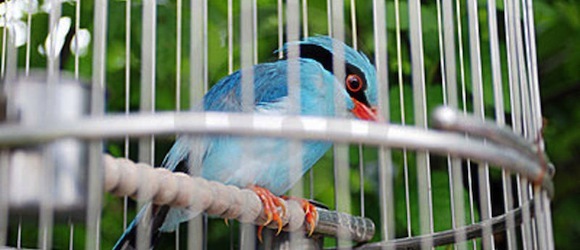
Help! How Do I Pet Sit a Bird?
You have owned cats, dogs, gerbils and hamsters. You are comfortable looking after them responsibly and efficiently. You have had numerous successful petsitting jobs-but now a problem. A promising and lucrative new petsitting opportunity has presented itself and it involves looking after four birds. Yikes!! What to do?
First a surprising fact. After dogs and cats, birds are the most popular pets in the United States. With so many people owning birds, there is a definite need for pet sitters who can offer knowledgeable care of birds.
Nuts and Bolts of Bird Sitting
- Clients can have one or two birds, some have three or four, and a few keep birds in aviaries. The cost for care depends on the size of the bird-small, medium or large.
- You need to educate yourself about birds by reading, talking to a friend who owns a bird or visiting an avian veterinarian.
- Learn how to handle major emergencies.(eg. a broken blood feather)
- Have a separate sheet of paper besides the standard contract, on which you make good notes regarding the bird’s care. Does the bird take regular baths? Does it have clipped wings? Does it go outside? Also make detailed notes on diet and the timing of feedings.
- Hygiene is very important when caring for birds. Wash your hands between feeding more than one bird to diminish transmission of disease.
- Birds have highly developed eyesight and learn much about their world from what they see. Birds can see in color, and will react to color and dress. It is good to wear approximately the same colour of clothing with each visit to the birds. For example, if you usually wear dark colours like black and one day you arrive in red, the bird may appear agitated. But color can be a bonus for bird sitters too as they love colourful toys and food.
- Birds don't see well in the dark and are very quiet at night; little eating, moving or talking. So if you are bird sitting in-house, do not be alarmed by this.
- Birds react to change…and are very aware of their environment. They have eyes on both sides of their head giving them a wide field of vision. Keep this in mind if you are going to change furniture, routine or food.
- Safety is a huge consideration, especially if there are other animals in the home. Both cats and dogs are natural predators and birds are prey. Obviously this means that the species should be closely supervised when they are together.
- One of the important things you will want to know as a bird sitter are the names of local avian vets. Birds have very different needs from dogs and cats. You should be able to get this information from the bird owner.
- As aways, no matter what animal(s) you are caring for, all expectations regarding care, pay, emergences and liability should be set in a signed contract.
It is important to realize that no one can give you any one set of instructions for caring for birds. Hopefully, you will work with informed owners/employers who are knowledgeable about the needs of species they own. Each time you care for birds your knowledge and confidence will grow.